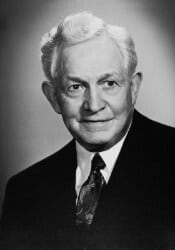
“No more sacred ordinance has been given to us by the Lord than the administration of the Sacrament.”
| Conference Report, October 1956, 88.

“No more sacred ordinance has been given to us by the Lord than the administration of the Sacrament.”
| Conference Report, October 1956, 88.

“The true end of life is not mere existence, not pleasure, not fame, not wealth. The true purpose of life is the perfection of humanity through individual effort, under the guidance of God’s inspiration. Real life is response to the best within us. To be alive only to appetite, pleasure, pride, money-making, and not to goodness and kindness, purity and love, poetry, music, flowers and stars, God and eternal hopes, is to deprive one’s self of the real joy of living.”
| General Conference, October 1963

| Pathways to Happiness

The greatest need in the world today is faith in God and courage to do his will.
| Teachings of Presidents of the Church: David O. McKay, p. 171

“No other success can compensate for failure in the home.”
| Conference April 1935

As Christ lived after death so shall all men live, each taking his place in the next world for which he has best fitted himself. The message of the resurrection, therefore, is the most comforting, the most glorious ever given to man, for when death takes a loved one from us, our sorrowing hearts are assuaged by the hope and the divine assurance expressed in the words: “He is not here: he is risen.” Because our Redeemer lives, so shall we. I bear you witness that he does live. I know it, as I hope you know that divine truth. May all mankind some day have that faith.
| Gospel Ideals, p. 48


“Marriage is a relationship that cannot survive selfishness, impatience, domineering, inequality, and lack of respect. Marriage is a relationship that thrives on acceptance, equality, sharing, giving, helping, doing one’s part, learning together, enjoying humor.”
| Experiencing Happiness in Marriage

“Sincere praying implies that when we ask for any blessing or virtue, we should work for the blessing and cultivate the virtue.”
| Secrets of a Happy Life, 114–15.

“No parent can consistently teach faith in Christ who profanes the name of Deity. Profanity is never heard in the well-ordered home. Swearing is a vice that bespeaks a low standard of breeding. Blasphemous exclamations drive out all spirit of reverence.”
| Gospel Ideals, Salt Lake City: Improvement Era, 1953, p. 420.